National Broadband Network (NBN) Scams
 NBN scam warning
NBN scam warning
Ignore calls claiming you need to immediately connect to the National Broadband Network or face disconnection.
With the rollout of the NBN broadband access network well underway in Western Australia it is important residents and businesses are aware that scams are attempted from time to time.
WA ScamNet has received several reports about the scam calls and NBN Co has issued a media release warning consumers not to respond or provide personal information to unsolicited callers or door knockers.
According to reports to WA ScamNet, an unsolicited call is received with a robotic voice claiming the call is from the NBN Co. The caller advises that as the NBN is available in the area your phone and internet will be disconnected within the next 24 hours unless connected now. You then get the option to press 1 to be connected to a technician.
Upon pressing 1, you are transferred to a call centre. While none of the people who reported receiving the call went past this point, you could potentially become a victim of ID theft if you provide personal information, lose your money if you agree to make a payment or possibly get charged a premium fee for the call.
Advice from NBN Co:
- Residents and businesses should be aware that NBN Co will never make unsolicited calls or door knock to sell broadband services. NBN Co is the company building and operating Australia’s wholesale broadband network and as a wholesale-only company, it does not sell broadband packages directly to residents or businesses.
- If something seems suspicious, NBN Co urges people to contact their phone or internet provider.
- Once the NBN access network is switched on in an area, residents and businesses have 18 months to contact a phone or internet provider to order an NBN powered plan before most existing landline phone and internet services are disconnected. This is to ensure people have time to speak to their preferred provider to discuss their individual needs for internet speeds and usage.
Tips to avoid scammers:
- Always ask yourself whether the person or business that’s contacted you out of the blue is who they say they are.
- Verify the identity of the contact through an independent source. Don’t use the contact details provided by the caller or in the message sent to you.
- Never send money, give your banking or credit card details or other personal information to anyone you don’t know or trust, and never by email or over the phone.
- Know that a government agency or trusted business will never ask you to pay them with gift or store cards, iTunes cards, wire transfers or bitcoin.
- Never give anyone remote access to your computer if they’ve contacted you unexpectedly – whether through a phone call, pop up window or email.
- Keep personal information secure online - change passwords often, don’t give credit card details to websites that aren’t secure, do not send copies of passports/drivers licenses to third parties that you did not contact yourself.
Related Scams
-
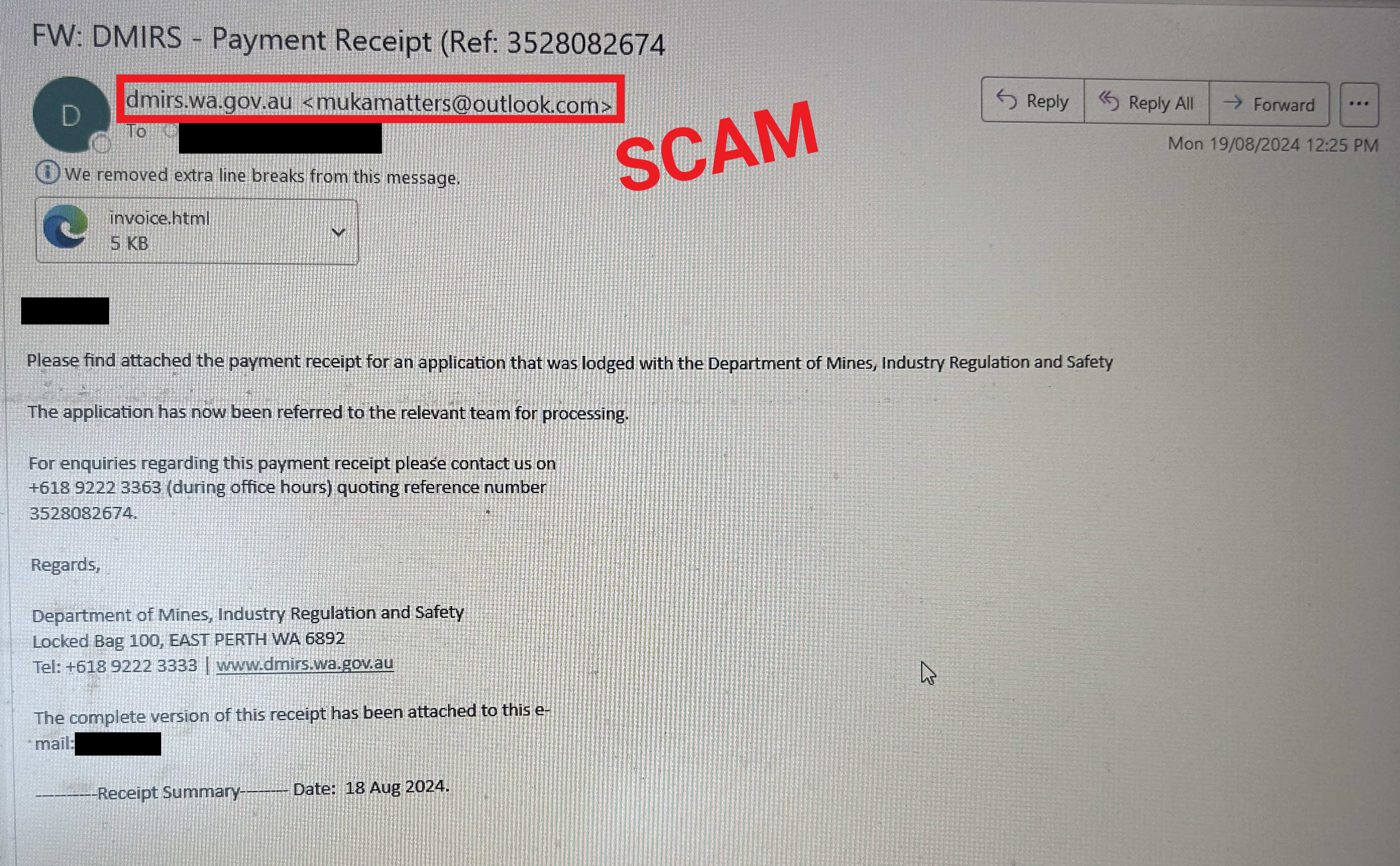
DEMIRS impersonation scam
Read More...Scammers are contacting people by text message (SMS) and email claiming to be DEMIRS or DMIRS.
-
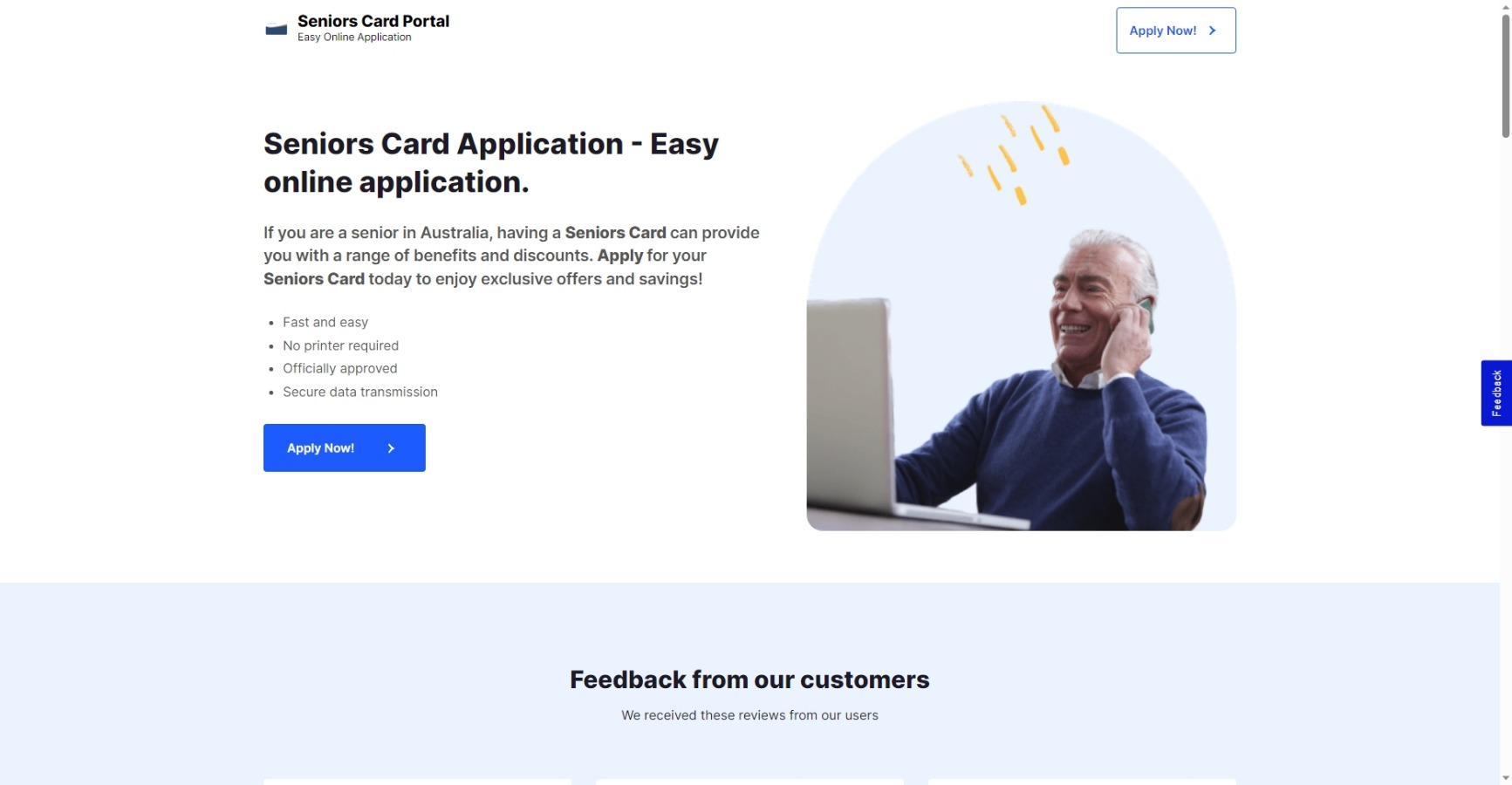
WA Seniors Card scam
Read More...Western Australian seniors are being targeted by scammers through a scam WA Seniors Card website requesting money and multiple forms of personal identification.
-
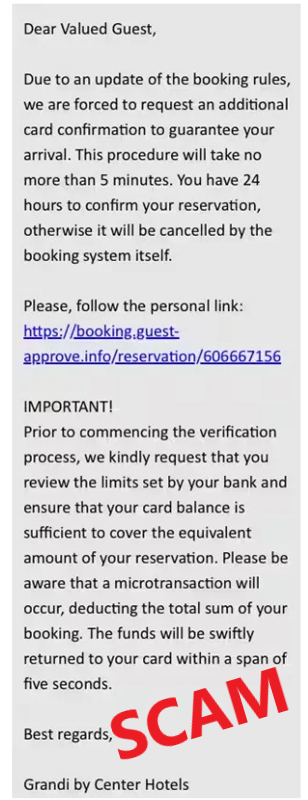
Hotel booking scam
Read More...WA ScamNet is warning WA travellers about a sophisticated new scam related to accommodation bookings that could risk turning their dream holiday into a nightmare.
-

Telco false billing
Read More...iiNet and Telstra customers are the target of an email phishing scam that aims to steal credit card details by using spoofed email addresses and claims of being unable to process payments.
-
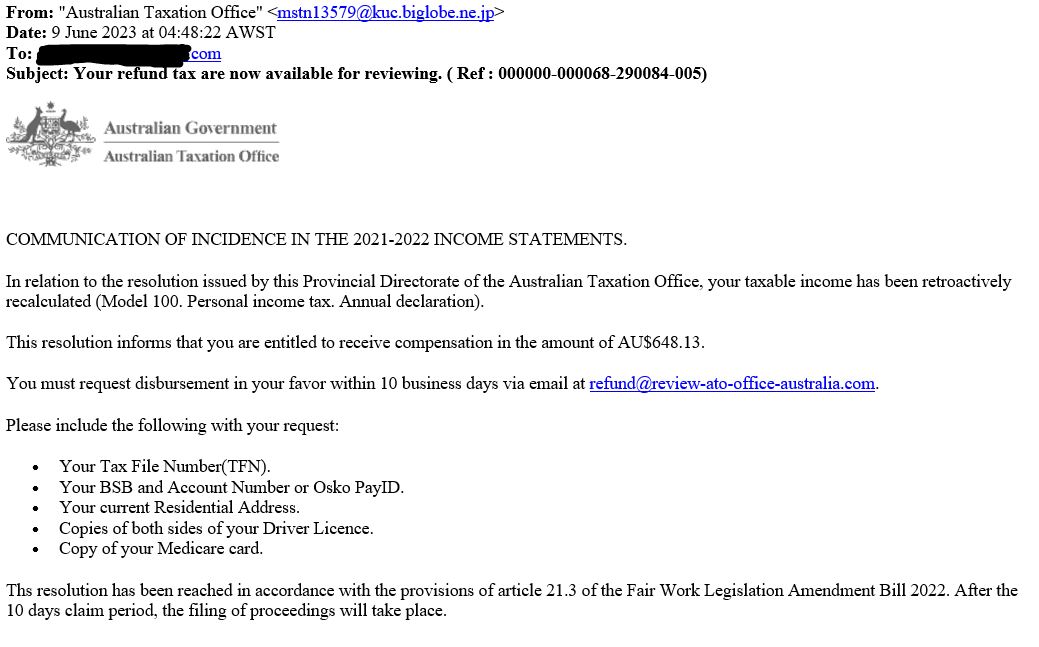
Tax phishing emails
Read More...WA ScamNet has renewed its warnings about fake tax communications after fresh reports of emails claiming to be from the ATO. Do not click on any links. Just delete it.
-
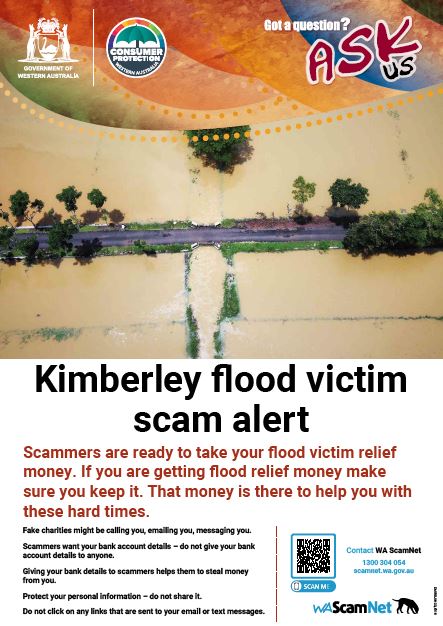
Kimberley flood victims targeted
Read More...More scams target Kimberley flood victims via social media.
-

Fake purchase phishing scam (Amazon & PayPal)
Read More...WA ScamNet is receiving increasing reports of scammers impersonating staff from Amazon and its streaming service Amazon Prime.
The calls and messages are a phishing scam to try to lure consumers out of their banking and personal information.
-

Don’t get infected by FluBot
Read More...If you’ve been bombarded with suspicious, garbled text messages lately that mention a missed call or voicemail, you’re not alone.
-

Payment redirection scams in property transactions
Read More...Property buyers and sellers need to be suspicious of any email appearing to be from their real estate or settlement agent asking for a payment of money or advising of a change in bank account details. This could be the work of scammers.
-

Discount bills
Read More...Scammers pretending to be from legitimate businesses are cold-calling people and promising savings of 20-40 per cent on their household bills.
-

Payment redirection scams
Read More...Alarm bells should ring if a supplier of services or goods contacts your organisation to provide new bank account details for you to pay them.
-

Who's really calling? Not the ATO or ACIC
Read More...Consumer Protection has received more reports from people who have received telephone calls from scammers pretending to work for government or law enforcement agencies.
-
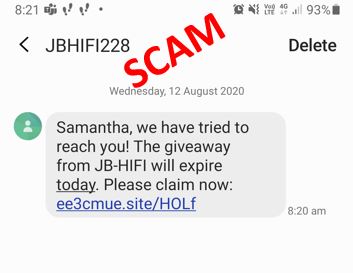
JB Hi-Fi giveaway scam
Read More...Scammers posing as electronics retailer JB Hi-Fi are sending SMS messages claiming there is a ‘giveaway’ that expires soon – but be warned, it’s nothing more than a phishing exercise to get hold of your credit card details.
-

Live stream scams
Read More...This type of scam appears to have emerged during COVID-19 when live stream events have become more popular due to social distancing restrictions.
-
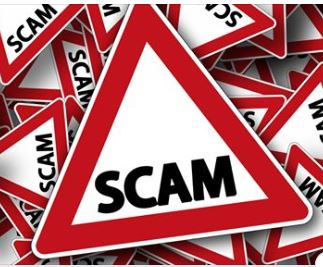
$70,000 in losses reported from victims of COVID-19-related scams
Read More...WA ScamNet has received reports from seven victims of scams where COVID-19 was used in the plot to steal a total of about $68,000.
-

The latest COVID-19 scams in Australia
Read More...Scammers are taking advantage of the COVID-19 coronavirus pandemic with numerous scams surfacing in Australia across many environments including banking, telcos, superannuation, Services Australia and more.
-

Check the tick before you click
Read More...These days, it pays to be extra vigilant on social media. Like-harvesting, or like-farming as it is also called, is a scam perpetuated throughout Facebook and features bogus pages designed to do nothing more than “harvest” your likes.
-

COVID-19 coronavirus scams
Read More...Scammers are taking advantage of fears surrounding COVID-19 to deceive victims into handing over their money and/or personal information, so it’s important to be extra vigilant.

-

False Invoices
Read More...Businesses are often targeted by scammers hoping that busy firms may sign invoices without checking their authenticity. Sometimes these fake invoices are for a listing in a publication which the business hasn’t ordered.
-

Chemist Warehouse survey
Read More...A fake online questionnaire claiming to be from popular chemists are doing the rounds. People receive a link to the survey, which may even appear to be sent by a friend or family member.
-

Online loan scams
Read More...Consumer Protection has issued an alert after many West Australians desperate to get a loan have been duped by online loan scams. Some of the scammers are stealing the identity of legitimate online money lenders, adding to the confusion of consumers.
-
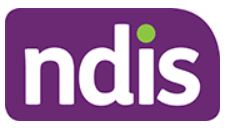
Fake NDIS callers
Read More...Scammers posing as NDIS providers are calling and requesting personal information and banking details.
-

Accident Helpline
Read More...Callers are falsely claiming to be from a legitimate Western Australian legal practice requesting information about a recent car accident.
-

Fake CEO scam
Read More...Scammers impersonate a CEO and use their email account to send an email to employees asking them to transfer money to a bank account.
-

Fake infringements and fines
Read More...There are a number of fake infringement notice emails doing the rounds. The most recent examples appear to come from the Police and Strathmore Cricket Club. Police do not send infringement notices by email or text so don’t be fooled by this email.
-
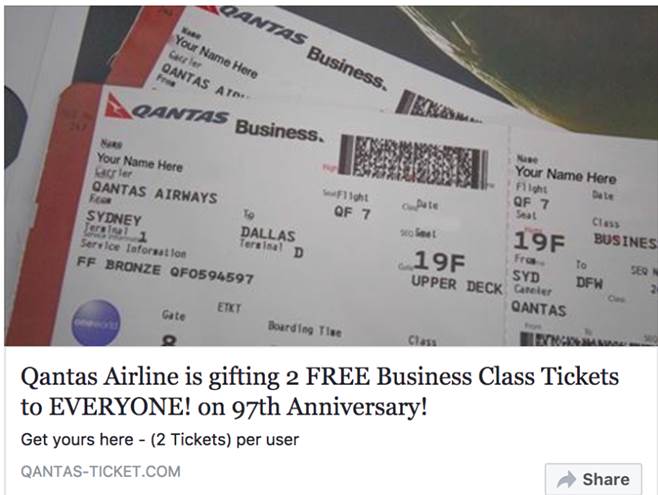
Qantas free tickets
Read More...Fake web pages claiming Qantas is giving away two free first class tickets for their 96th anniversary are being shared on social media.
-

Qantas Customer Satisfaction Survey
Read More...Qantas Frequent Flyers should be aware of a bogus email to ‘complete the survey’ and ‘claim a reward’ - it a phishing scam.
-

Smales caught in help me scam
Read More...Scammers are using the name of a well known Subiaco jeweller in a new version of the ‘help me’ scam.
-

Car Crash Compensation Phone Scam
Read More...Scammers are offering compensation for a car accident in an attempt to obtain personal information from victims.
-

Can you hear me? suspected hoax
Read More...A suspected hoax is being used as a way to try to sell call blockers.
-

Australian Red Cross blood donors beware
Read More...The Australian Red Cross Blood Service announced that a file containing personal data of more than half a million donors, has been exposed online.
WA ScamNet has more information and scam prevention tips.
-
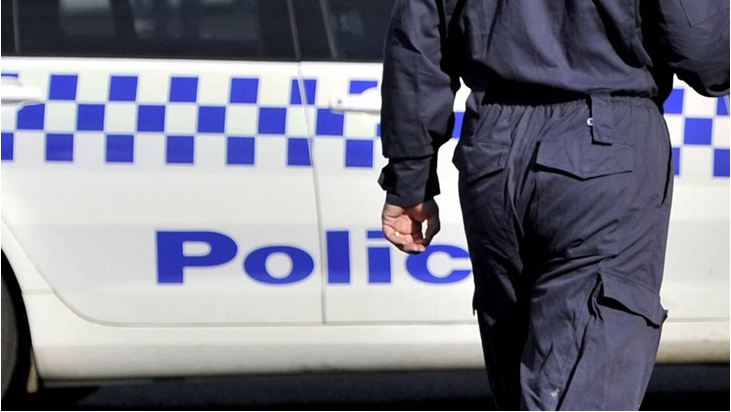
Fake WA police officer scam warning
Read More...Consumer Protection has noticed an increase in the number of scammers posing as WA police officers in an attempt to con money out of unsuspecting Western Australians.
-

Department of Transport (DoT) scams
Read More...A caller, claiming to be from DoT, asks for insurance/personal details over the phone and may also involve automated calls asking customers to respond to a survey.
-
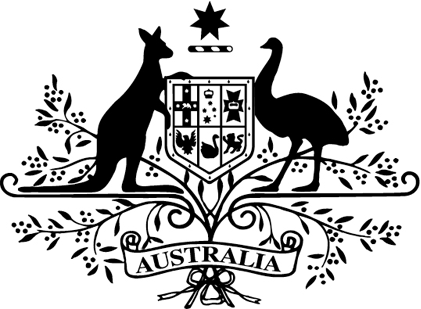
Phone scammers pose as Federal Government employees
Read More...Consumer Protection’s general advice line and regional offices have been getting lots of reports from consumers regarding phone scammers claiming to be from the Federal Government. The caller offers either a rebate or refund of overcharged fees.
-
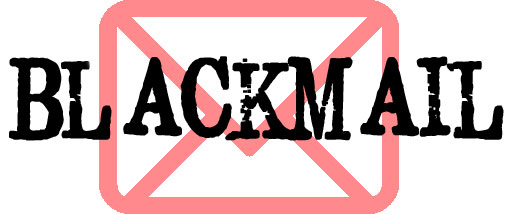
Online blackmail scam targets students
Read More...Students are being warning about an online blackmail scam, whereby scammers are trying to extort money from students visiting essay chat forums. Scammers gain personal information and create spoof emails from universities in order to trap students into paying up big bucks.
-
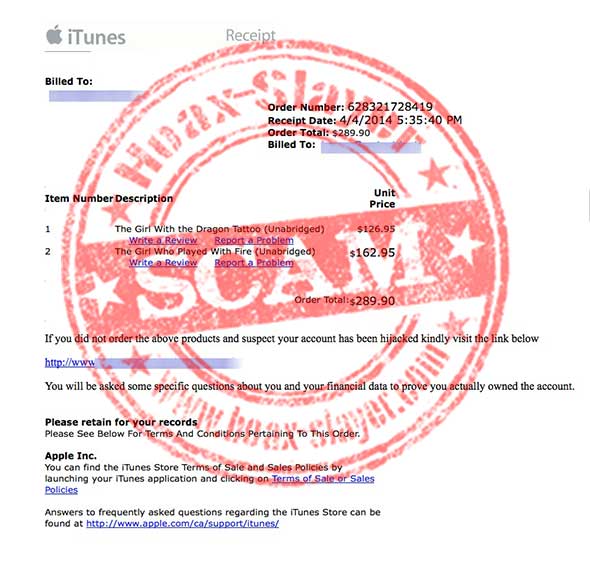
Fake iTunes receipt phishing email
Read More...Email claiming to be from Apple's iTunes store lists expensive orders supposedly charged to the user's account. But clicking this link will give the scammers secure personal details.
-

myGov fake emails
Read More...WA ScamNet regularly receives reports about scam emails that claim to be from the Australian Tax Office (ATO).
Usually the email’s offering a tax refund or it might be asking you to update your details.
The body of the email will ask you to click a link – never do this as this is how the scammers will get your details.
-

Commerce government officer impersonations
Read More...Scammers are pretending to be Commerce officers in email and phone scams.
-

Real estate scam attempt thwarted
Read More...Consumer Protection and WA Police have issued a joint warning to real estate agents after scammers tried to sell a Perth home without the owner’s knowledge. An overseas organised criminal network began the process of selling the home by emailing the Property Manager, using a fake email address which mirrored the true owner’s name. Thankfully the agent followed WA Government guidelines which were introduced following the fraudulent sale of a Karrinyup home in 2010 and a Ballajura home in 2011.
-

Voucher Prize scams
Read More...Beware of “voucher prize” scam text messages. Do not to respond to text messages which claim you have won a voucher, In fact you may be entering into an expensive mobile premium SMS service.
-

SMS competition & trivia scams
Read More...An SMS competition or SMS trivia scam usually arrives as a text message and may encourage you to enter a competition for a great prize.The scammers make money by charging extremely high rates for the messages you send, and any further messages they send to you. These charges could be as high as $4 for each message sent and/or received.
-

Telemarketing
Read More...Telemarketing or ‘Cold calling’ is an unexpected or unsolicited telephone call offering investments or financial advice. The investments they offer usually guarantee high returns or encourage you to invest in overseas companies.
-
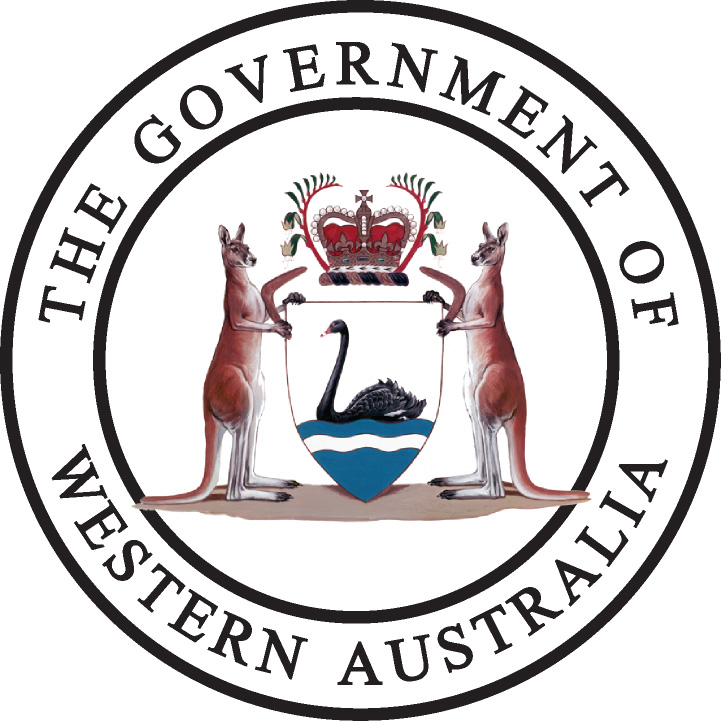
Australian Fair Trading
Read More...What a cheek! Cyber criminals aim to steal your identity by putting out an email confirming your “complaint” about identity theft!
-

Confirmation Orders
Read More...An email arrives confirming your order for a lap top computer or other product or service. The email attachment provides further details of your order. Hang on! You haven’t ordered a laptop. You click on the attachment to find out more information, fearing that somebody has stolen your credit card information to place the order. And that’s exactly what the scammers are relying upon
-

Hang Seng Bank
Read More...Con artists posing as employees and senior executives of the Hang Seng Bank are trying to rope you into becoming a ‘partner’ in a business transaction.
-
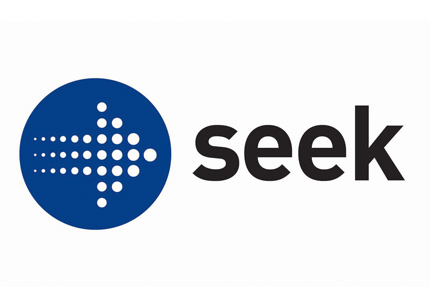
SEEK job scams
Read More...The operators of these sophisticated scams use a well-known legitimate job vacancy website to hook you in to revealing your details.
-

TNT Courier Service
Read More...Scammers are using the names, brands and logos of well-known companies, including courier services, to hook you into advance fee fraud and lottery swindles.



